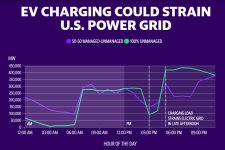Roscobbc
Moderator
I copied this off a thread on Rods 'n' Sods relating to an electric Ford Pop hot rod. Whilst most of the content is challenging to follow IMHO it makes you realise perhaps how very 'fragile' our energy (and specifically electric) network is and really shows that we are not longer in control of our own power supplies. The fire a couple of weeks ago at a 'converter' station in south east england seriously reduced the UK's capacity to 'import' power via cable from France and will seemingly take months to repair and come back on-line. That's OK you might say - we're told that at times we are self sufficient in power generation. That is true - but only when there is a wind blowing and a 'summer' demand. A winter demand and the future increased loading on the system with people charging cars overnight will be a challenge - especially with a number of fossil fueled and nuclear generating stations being de-commissioned and plans for the Chinese to build more stalled.
Quote
#14 · 2 d ago
I've a lot to do with EVs and charging networks day to day. The projects are quite challenging in terms of getting CANBUS data networks to talk to each other, the packaging of which isn't very aesthetically pleasing.
You'd question the weight increase, safety in terms of what happens if you hit something without the energy absorbing zones around the battery packs as they will short and start a nasty fire the fire brigade can't extinguish.
I'm also involved with energy networks and grid technology. The cost of transmitting energy is going to be up to 100 times higher, (and is about a third of your bill currently), coupled with brexit severing the access to the EU balancing market, where we used to buy energy at rock bottom prices, (£34 a MWh... £14 per MWh to import it over the PEG Nord inter connector), you can see my daily trading data below, it's now £261 per MWh and PEG Nord inter connector is £94!!!!. And this is only the beginning as the thermal fleet goes offline, (coal, nuclear), we're loosing terrawatts of generating capacity. Add EV's to this and you're looking at a disaster. You are being protected from these price rises by the cap.
Without this, (and it will go...), you'd be paying 37p a kWh at present plus network costs of 12p rising to 25p at peak demand times on smart metered industrial contracts. That's 49p kWh to 62p kWh..... we were paying 8p to 17p tops.
This is before the effects of Brexit really kick in, before the balancing costs rise, and before the gas supply issues being at the end of a long Russian pipeline have fed through, (they cut 50% of our supply last week for no reason). I have already seen prices of £4000 per MWh on the spot market. Remember, it was £35 prior to Brexit.
Finally, justification for a V8

So the data from just before Brexit, which already almost doubled prices on the UK power, (but you can see the cost of the PEG Nord inter-connector were low - B*rris had not then refused the offer of the EU to continue to participate in the cross boarder energy market - they never bothered to negotiate a deal for energy transfers...).

And after. Lol. Unless you want to use electricity.... in which case solar panels and battery may be a good idea. EV's less so.
End Quote
,
Quote
#14 · 2 d ago
I've a lot to do with EVs and charging networks day to day. The projects are quite challenging in terms of getting CANBUS data networks to talk to each other, the packaging of which isn't very aesthetically pleasing.
You'd question the weight increase, safety in terms of what happens if you hit something without the energy absorbing zones around the battery packs as they will short and start a nasty fire the fire brigade can't extinguish.
I'm also involved with energy networks and grid technology. The cost of transmitting energy is going to be up to 100 times higher, (and is about a third of your bill currently), coupled with brexit severing the access to the EU balancing market, where we used to buy energy at rock bottom prices, (£34 a MWh... £14 per MWh to import it over the PEG Nord inter connector), you can see my daily trading data below, it's now £261 per MWh and PEG Nord inter connector is £94!!!!. And this is only the beginning as the thermal fleet goes offline, (coal, nuclear), we're loosing terrawatts of generating capacity. Add EV's to this and you're looking at a disaster. You are being protected from these price rises by the cap.
Without this, (and it will go...), you'd be paying 37p a kWh at present plus network costs of 12p rising to 25p at peak demand times on smart metered industrial contracts. That's 49p kWh to 62p kWh..... we were paying 8p to 17p tops.
This is before the effects of Brexit really kick in, before the balancing costs rise, and before the gas supply issues being at the end of a long Russian pipeline have fed through, (they cut 50% of our supply last week for no reason). I have already seen prices of £4000 per MWh on the spot market. Remember, it was £35 prior to Brexit.
Finally, justification for a V8
So the data from just before Brexit, which already almost doubled prices on the UK power, (but you can see the cost of the PEG Nord inter-connector were low - B*rris had not then refused the offer of the EU to continue to participate in the cross boarder energy market - they never bothered to negotiate a deal for energy transfers...).

And after. Lol. Unless you want to use electricity.... in which case solar panels and battery may be a good idea. EV's less so.
End Quote
,


